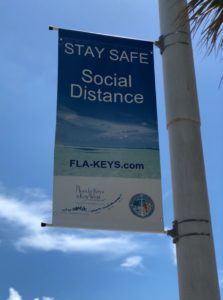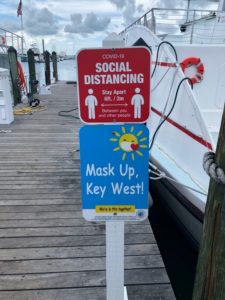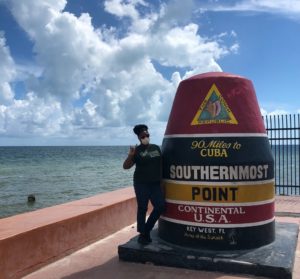By Kris-An Hinds

So here we are, in the middle of what many people thought was going to be a potential apocalypse. Did I expect to be conducting research during this time? No. At the beginning of my adventures as a PhD student at the University of South Florida, I thought my biggest obstacles to graduating would be finding a way to balance and thrive in my personal, academic, and professional life. Being able to conduct research during a global pandemic was never on my list of worries. However, beginning in early 2020, the world was put at a standstill due to the now infamous severe acute respiratory syndrome coronavirus 2 (SARS-CoV-2 also known as coronavirus).
Before the pandemic, I was selected, as a part of an interdisciplinary team, to research coral reef restoration and monitoring solutions in the Florida Keys for the Summer of 2020. Our Florida Keys Strong Coast Challenge Grant is an interdisciplinary research study carried out by Strong Coasts Fellows, Kris-An Hinds (Department of Anthropology), and Michelle Platz (Department of Civil and Environmental Engineering). The goal of the project is to add to our understanding of the Florida Reef Track as a socio-ecological system. As such, in the study we are exploring how researchers, practitioners, and policy makers can consider both social and ecological engineering factors when determining the best practices for coral reef restoration and monitoring programs.
Conducting anthropological research during a global pandemic has presented many challenges. As the project’s lead anthropologist, my biggest question was “how can we capture a community’s understanding of our research inquiries without being able to safely meet with the community in person?” Below are some of the considerations and approaches my research team and I are embracing during our ongoing project in the Florida Keys Challenge Grant.
Embrace going virtual with data collection
Restructuring of the data collection from our original pre-pandemic plan occurred in three different stages. The first step of restructuring how we would conduct this research was to reevaluate and modify the data collection methods. Initially, the project relied on using in person, semi-structured stakeholder interviews combined with participant observation to determine perceptions on coral reef restoration and monitoring in the Florida Keys. Due to the potential risk of being exposed to or exposing our participants to coronavirus, the interviews were restructured to a virtual format via a secure, encrypted online platform. This was accomplished by rephrasing the interview questions that relied on the participants interacting with their work environment into questions that allowed them to be descriptive in nature. As an added layer of security while using the online platforms, we enable the lobby/waiting room feature of the platforms we use. This allows us to monitor and limit who can access the interview. In addition to this, an unforeseen favorable benefit of switching to virtual interviews is access to a larger group of stakeholders. We are able to interview individuals who are usually harder to meet with due to their busy schedules.
We also worked with our university’s IRB to modify the consent process to allow for verbal consent. After agreeing to be a research participant, interviewees were emailed a copy of the verbal consent document for review. During the beginning of the interview, the research team would read the consent document verbatim and provide participants a change to ask any questions they had regarding the project. Individuals would then verbally state if they agreed to participant in the study and if the consented to their confidential interview to be recorded.
To prepare for virtual interviews, it was essential for us to create a remote space that would mimic the field environment and university setting. One of the ways that this was achieved was through the conversion of my dining room into an office space. Having a quiet space with adequate light was important to insuring good audio and visual quality for later data transcription and analysis.
Embrace the unpredictable
Be flexible. As cliché as it might sound, flexibility is essential to conducting research during a global pandemic. Using a virtual platform for data collection often results in unexpected technical and scheduling issues beyond our control. We found that the key to dealing with these issues was to troubleshoot the issues we could and ask for help for the issues we could not solve on our own. Extending ourselves the same courtesy that we would provide one of our research participants has been key in allowing us to maintain our mental health during this time. The research conducted during this time should not and cannot look the same as the research of the past. Keeping things in perspective has led to us collecting more fruitful and realistic data expectations. One of the ways that we are mindful of this is by incorporating debriefing sessions before and after each interview between myself and my research partner. We take this time to discuss the highlights of the interview, reoccurring themes that are already emerging, and topics mentioned that we want to explore further. Most importantly, we take this time to simply check in on how we are feeling that day. We reflect on how our own positions and feelings may have influenced our thoughts on the interview, as well as the probing question we used for clarification and follow up.

Embrace protecting participants and research team members
Although we are unable to conduct traditional participant observation, we have been fortunate to be able to travel to our field site for monitoring the technology testing portion of our research, while following university restrictions and guidelines. This comes with a great responsibility to limit the risk of contracting and spreading COVID-19. As such, while in field, we prioritized embracing safe practices for ourselves and encouraged those around us to do the same. Some of the ways we are doing this are:
- Limiting interactions with non-essential research personnel;
- Always wearing a face mask and having face masks/face shields available for those that we interacted with;
- Carrying hand sanitizer and other cleaning supplies with us to ensure they were readily available in our cars, field bags, lodging, in our pockets, etc.;
- Recording our temperature in the morning and evening to monitor for signs of being sick.
The future of research and life in a post COVID-19 world is still very unpredictable. However, working through this uncertainty has shown us that finding alternative ways to capture meaningful community- and stakeholder-driven research is possible. As we embrace more innovative and adaptable strategies for dealing with the unprecedented and unknown challenges that COVID-19 will create, it is important that we not lose hope.

Kris-An Hinds, Strong Coasts Fellow, following CDC guidelines with a mask cover while conducting her graduate research.
About the author. Kris-An Hinds is pursuing a PhD in Applied Anthropology at the University of South Florida (USF). She received her BA in International Studies and Masters in Applied Anthropology from USF. Her Masters research examined resident perspectives of public policies and regulations on stormwater management, area infrastructure and redevelopment, and environmental justice issues in Hillsborough County, Florida. Currently, Kris-An’s research investigates the adaptation and mitigation strategies used by Caribbean coastal communities to increase their level of resilience to climate change and natural disasters with an emphasis on equitable practices. Kris-An is a Florida Education Fund McKnight Doctoral Fellow, a Student Research Associate for the Center for Brownfields Research and Redevelopment and an executive board member for the Applied Anthropology Graduate Student Organization at USF. She is also passionate about issues related to the resettlement of Tampa’s refugee population and serves as a volunteer English as a Second Language for the CARIBE Refugee Program.
STRONG COASTS is supported by a National Science Foundation Collaborative Research Traineeship (NRT) award (#1735320) led by the University of South Florida (USF) and the University of the Virgin Islands (UVI) to develop a community-engaged training and research program in systems thinking to better manage complex and interconnected food, energy, and water systems in coastal locations. The views expressed here do not reflect the views of the National Science Foundation.

Comments are closed.